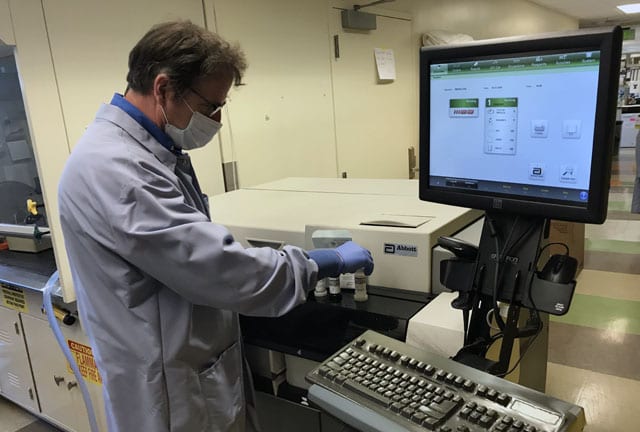The tests are expected to improve medical understanding of the virus, including how long antibodies stay in the body and if they provide immunity.
A new clinical blood test will start being conducted at the UW Medicine Virology Lab, beginning next week, to check people for past infection with SARS-CoV-2.
The test looks for the presence of an antibody, called IgG, which people produce in fending off the pandemic coronavirus. The antibody first appears several days or longer after a person contracts the virus, even in those who never had symptoms or had just mild to moderate respiratory illness.
“There are people who say, for example, ‘I was pretty sick back in February. Could I have had COVID-19? back then?’” said Dr. Keith Jerome, professor of laboratory medicine at the University of Washington School of Medicine. Nasal swabbing screens for a present infection, but can’t indicate whether someone had the infection in the past and recovered. The antibody blood test can. It is done via venous blood draw. While it is not a rapid, finger-prick test, once the specimen arrives at lab, it can be analyzed promptly.
The virology lab is receiving shipments of this Abbott laboratory test for clinical use. The tests are expected to improve medical understanding of the virus, including how long antibodies stay in the body and if they provide immunity. This knowledge could support the development of treatments and vaccines. The appearance of certain antibodies in the blood could become one of the markers that an experimental vaccine is conferring resistance to the infection.
Earlier, the UW Medicine Virology lab helped Abbott evaluate the performance of its viral assays and how best to use them. They compared blood samples from confirmed cases with samples taken for other reasons before the new coronavirus emerged. The assay was found to be highly sensitive for antibodies to SARS-Cov-2, and also highly specific. It could spot a past infection with this new coronavirus and not confuse it with other viruses, including other respiratory coronaviruses.
The widespread availability of tests for immunity to the pandemic coronavirus could be vital to the re-opening of businesses and schools and return of workers. Compiling results can also reveal how prevalent the pandemic has been in certain localities or popular.
Among the researchers who worked on evaluating the Abbott antibody test was Dr. Alex Greninger, assistant professor of laboratory medicine in its virology division. The offering of this new test is another major achievement during this pandemic for UW Medicine Virology. Soon after cases requiring hospitalization in Washington state appeared, Greninger was instrumental in obtaining FDA approval for his team’s laboratory-based test of nasal swabs to diagnose active cases of COVID-19 at UW Medicine labs, instead of waiting for results from distant labs.
Patients will be able to obtain the new antibody blood test through an order from their healthcare provider. Nurses in employee health centers eventually may be able to request testing for members of their workforce, and the test may eventually become part available through certain public health programs.
Jerome described the advent of high-performance antibody tests as another positive turning point in the pandemic. This advance, he said, is similar to the milestones reached in new options for testing for the presence of the disease and successes in flattening the curve of new cases in some places through public health measures.
The hope is now that the next milestones on the path to stemming the pandemic will be reached: greater access to testing, effective treatments, preventatives and vaccines.
“We are looking forward to the days when people start going back to work and enjoying their social lives again,” he said.
Information for clinicians about ordering an antibody test for a patient or collecting and submitting a venous blood sample is available at the UW Medicine Virology website.


